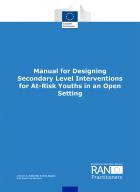Details
- Publication date
- 21 April 2022
- Author
- Directorate-General for Migration and Home Affairs
- RAN Publications Topic
- Formal/informal education
Description
Radicalisation and violent extremism are not confined to a single age group, gender, or community. However, young people are particularly vulnerable to this type of discourse and are more particularly represented in these violent extremist movements. Research and work of the RAN in recent years show the need to work with young people and their families.
Repressive responses to extremism are not sufficient, particularly when working with young people. A preventive approach provides the opportunity to consider the underlying causes of the process and to strengthen the resilience of young people exposed to the risk of radicalisation or already in early stages of the radicalisation process. Prevention work involves three levels: primary, secondary and tertiary.
The Rehabilitation Manual was designed for professionals working for the benefit of tertiary prevention. This manual is designed for professionals working with young people in secondary prevention and in an open environment.
Therefore, these are actions aimed at preventing young people from becoming further radicalised and preventing them from engaging in criminal or violent activities. Unlike rehabilitation interventions, these actions take place in a pre-criminal space before there is any conviction.
Practitioners in the field of preventing and countering violent extremism (P/CVE) face various challenges – from financial and other resource limitations to acceptance and credibility, as well as political, legal and national/international pressures. There is also the challenge of ensuring that the limited resources are targeted at the correct level and user group.

